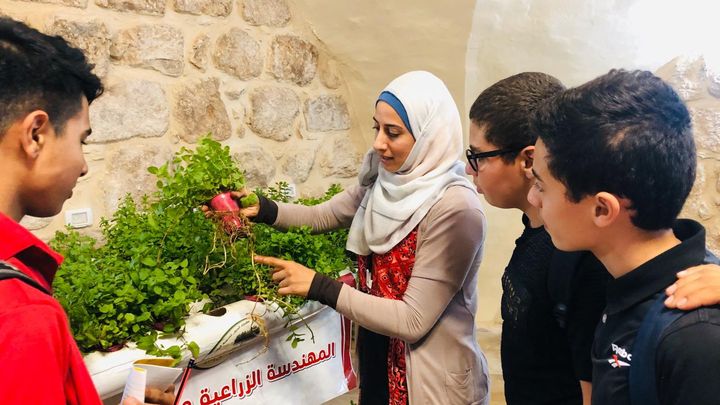
Empowering Communities Through Hydroponics in the West Bank
Donation protected
This fundraiser is on the behalf of Maram:
I am Maram Waridat from al-Dahiria, south of Hebron, Palestine, and I hold a Bachelor's degree in Agricultural Economics and Agribusiness Management from the University of Jordan. As a community activist, I have volunteered with various institutions and won the Agathon Challenge - Palestine, which enabled me to launch a hydroponic farming project in 2019. I established a greenhouse in Hebron Governorate, the first of its kind in the area, to teach hydroponic farming techniques. I also earned an International Trainer certificate in Permaculture and won second place in the Arab Youth Forum competition in Kuwait.
My project integrates production, education, and community work. The greenhouse, spanning 315 square meters, produces high-yield, pesticide-free leafy vegetables. I propagate and distribute vegetable seedlings to local nurseries, creating an inspiring model for community members, especially women. I initiated school visits and organized student field trips to my project, collaborated with cultural centers like the ISNAD Community Education Center to conduct agricultural courses, and provided practical learning experiences, deepening my understanding of the agricultural sector in southern Palestine.
In the community work aspect, I engaged community members in greenhouse tasks, marketing, and local market connections. I networked with agricultural initiatives, organized volunteer opportunities for women, and supervised a project where nine mothers of children with disabilities cultivated a plot of land. This created a safe space for women to volunteer, work, learn, and exchange agricultural knowledge.
Challenges
Community initiatives in Palestine, especially those led by women, face numerous challenges that hinder achieving their goals. The biggest challenge is the Israeli occupation. Our greenhouse suffered significant damage due to Israeli forces throwing sound bombs and tear gas bombs, which severely tore it apart. This led to a complete halt of the project, especially amid the war on Gaza, which made anything Palestinian a target for Israeli forces. Other challenges included marketing difficulties and market competition due to the dominance of large producers and the importation of most food products from Israel, marginalizing Palestinian farmers and causing their produce to go unsold.
Next Phase
In the next phase, we aim to restore the greenhouse and equip it internally and externally, relaunching it as a space for volunteering, learning, and productive community agricultural work. We seek to develop various hydroponic systems and introduce an aquaculture system for ornamental fish production (ideas that the southern Palestinian regions lack). Additionally, we plan to dedicate a room next to the greenhouse for educational purposes and provide explanations on agricultural topics, particularly for people with special needs. Currently, the greenhouse contains vertical, pyramid, and horizontal hydroponic systems and wicking bed systems that conserve water, although some need renewal. We will also complete digging a well next to the greenhouse to meet the project's water needs.
Budget
In the next phase, we need around $13,000 to cover the following costs:
Repairing the greenhouse: $2,500
Repairing the hydroponic system inside the greenhouse: $1,500
Designing the aquaculture system: $2,000
Purchasing seedlings and natural fertilizers: $1,000
Completing the water well: $5,000
Buying water tanks: $500
Equipping the educational room: $500
Due to the high costs, the constant need of these systems for electricity, and their dependence on fertilizers; We are now in the process of transforming it into a humane farm based on the principles of ecological agriculture. While a model of each system remains, the farm becomes an integrated educational destination.
Organizer
Zuleikha Karolia
Organizer
England